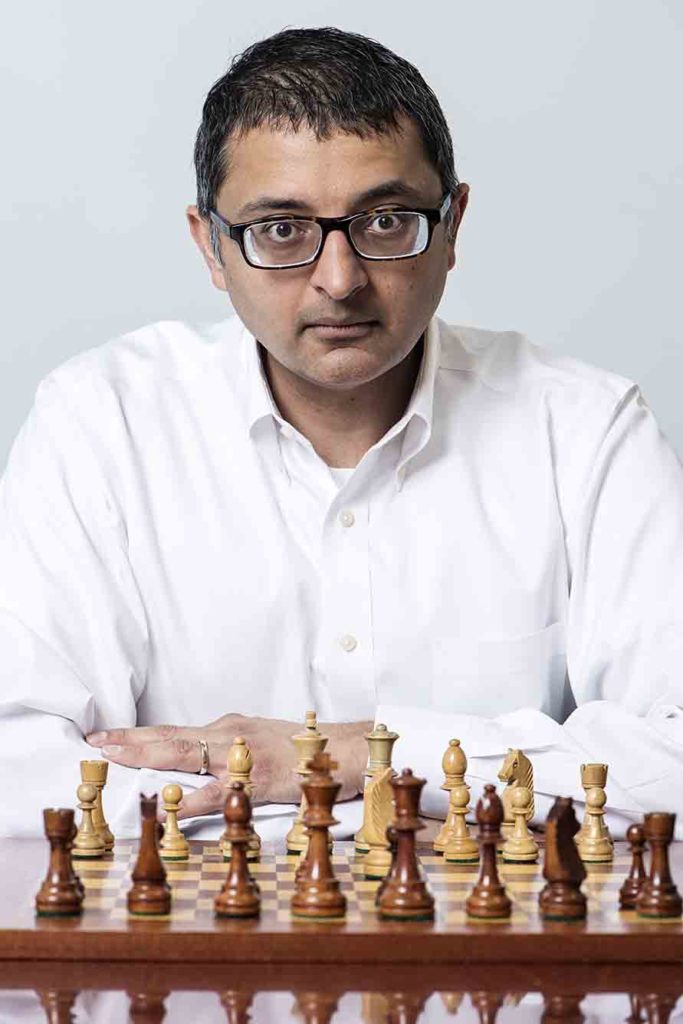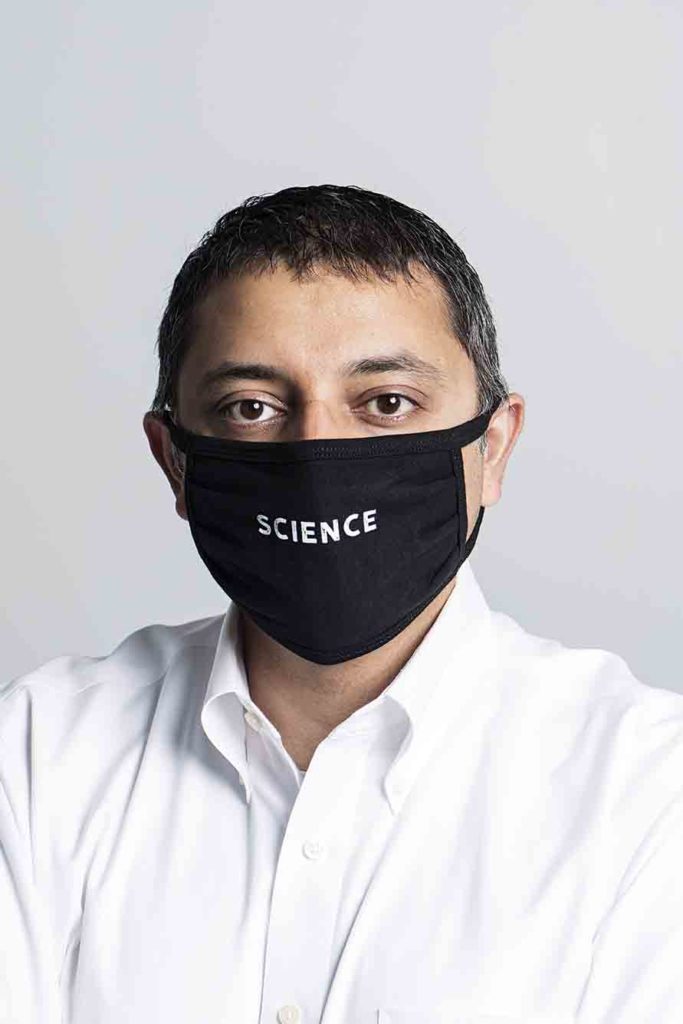The Communicator in Chief

The Communicator in Chief
Maine CDC director Dr. Nirav Shah on how to talk to people during a pandemic and why he doesn’t believe in silver linings
by Paul Koenig
Photography by Nicole Wolf
Issue: October 2020
Less than a year after he moved to Maine, Dr. Nirav Shah found himself in the spotlight. As the head of Maine’s Center for Disease Control and Prevention, Shah has become the familiar face and steady voice of the state’s COVID-19 response. But amid his updates on positivity rates, hospitalizations, and deaths, Shah injects a sense of empathy. He encourages people to stay socially connected while physically distancing and reminds the public that each of the case numbers represent someone’s neighbor, friend, and family member. He also provides a rare commodity during this time: clear information that people trust. For all of this, Shah has become somewhat of a folk hero. There’s a Fans of Dr. Nirav Shah Facebook page, and Wilbur’s of Maine put him on a chocolate bar in June.
You have said that trust is crucial for people to listen to what science says. How do you gain that trust, especially when you’re telling people things they don’t want to do or hear?
I don’t know. That’s the bottom-line answer. I seem to have gained the trust of folks. It’s ironic and mystifying, because in each and every one of those press conferences that I’ve convened, I stand up there for an hour and do nothing but deliver bad news. X number of people have died, Y number of people are infected, there are this many outbreaks, we are running low on PPE, we don’t have enough testing supplies. That’s all I do. I think what’s essential about situations where people know bad things are happening is to acknowledge that head on. I never sugarcoat it. I have a rule that I repeat to myself every time before I go live on TV. That is, “If someone asks me what time it is, I will not tell them how to build a clock.” One of the reasons that I think people have a loss of trust in public officials is that most public officials will just tell you how to build a clock. I give it to people straight. If I make mistakes, I immediately correct them. If I don’t know the answer, I tell you, “I don’t know the answer, but I will find out for you.” There is no magic formula.
You’ve been praised for communicating in clear terms people understand. Is that something you had to learn how to do?
I wish I could just tell you that it comes naturally. No, it doesn’t. If I go out there for an hour and use a bunch of gobbledygook that no one understands, I have literally not accomplished anything. I spend a lot of time preparing before I talk to anybody. Press conference, a church group, a group of college kids, I don’t care what it is. I sit down, sit down with myself and say, “What is my one key message here? What is the one thing I want everyone to walk away remembering what I said?” Then I build everything else around that. I practice it with lots of people. I talk about things with folks to see if they get what I’m getting at. If they don’t, I go back to the drawing board. My goal is to deliver messages to keep people safe, because that’s what’s on the line here, right? It’s not what color you should paint your house. It’s how do you stay alive out there. I take it really, really, really seriously.
Has the pandemic changed how you view the role of the government when there’s not a crisis?
Being a public health person, it’s kind of like being the best man at a wedding. You do a great job when no one ever sees you, everything goes smoothly, nothing goes wrong, everything works on time. That’s kind of what modern public health is about. It’s this invisible force field. And I think what’s happened because of COVID is that folks now have a finer sense of what public health departments do, and then obviously what can happen if they’re not funded to the levels that they need to be. That’s been a perennial issue not just in Maine, but in all 50 states and dozens of cities, as well as at the federal government. Funding for public health has been systematically reduced over a 20-year period. And I think what has happened now is a finer appreciation of what happens when you don’t fund things. At the national level, it gives our advocates in Congress an ability to say, “Hey, this is important. Congress really needs to fund the U.S. CDC more.” I’m not a silver linings kind of guy. But I think this will lead to a better indication of why it’s important.
Why are you not a silver linings kind of guy?
Because silver linings can be interpreted as good news. When in the midst of something bad, I’m just so cautious to suggest that there might be something good going on. When all of this is done and over with? Sure. Historians will look back and identify that there were changes that were positive that came out of COVID, no question about that. But in the moment, to be totally straight with you, I think it sort of misses the mark a little bit. I think it’s a little off tone when 125 people in Maine have died, 150,000 nationally. It strikes me as unfurling the “Mission Accomplished” banner.

“My goal is to deliver messages to keep people safe, because that’s what’s on the line here, right?”
Is there anything in your life that led you to feel that way?
My dad passed away about a year ago. He was chronically ill for about five years. He had a lung condition called pulmonary fibrosis. There were some days when he would do well, and it was great. But it never made me feel good, because, OK, you did great today. But you know what? You’re not doing well, you’ve got a terminal disease. I got to a point where my dad would go on a walk in the morning, and my entire mood for the day would be based on whether he had a good walk or a bad walk. Whether he could make it 20 feet or a half a mile. You kind of wonder, what’s the point of the silver lining? It’s still really bad. And that’s kind of how I think about COVID. Sure, there’s good news, and you’ve heard me share good news. But good news can change. Just like my dad’s daily walks. And it can lead people to ignore the fact that there’s really bad stuff going on out there. So that’s the reason you’ll never hear me taking a victory lap in any press briefing.
What does the other side of this look like? When will you feel OK taking a victory lap?
When will I feel like it’s appropriate to talk more about positive elements and what we’ve learned? I think not only when we’ve gotten a vaccine, which, who knows when that might be. But also when the uptake of the vaccine has been sufficient to start really conferring herd immunity. Because those two things are not coincident with one another. The vaccine could hypothetically be released on January 1, but we may not reach herd immunity until months after that. And I think when we get to that level, what we would expect to see numerically is multiple weeks with zero cases. That’s the time when I think it would be appropriate to sit down with everybody and take stock of the good things that have happened, of which there are a lot. Families have come closer together. I don’t know about in your world, but our dog is loving whatever is going on right now.



